Gallatin, Tennessee: The Town That Rose Above Tragedy to Become 2017’s Nicest Place in America
Updated: Jun. 23, 2021
This town's moving story of strength and kindness will restore your faith in humanity.
On April 6, 2016, James Spray, a white police officer in Gallatin, Tennessee, responded to a call about an eviction going bad. When he got out of the car, he encountered Laronda Sweatt, an African American woman, who was coming at him with a battle axe. He drew his gun as he backed up, shouting at her to drop the weapon. She continued to advance. He continued to retreat until stumbling into another squad car that had pulled up behind him. Back against a wall, he shot twice. She went down. It all happened in 11 seconds.
Just 20 months after protests erupted in Ferguson, Missouri over the killing of an unarmed African American man by police, what seemed at first like a similar injustice threatened to tear Gallatin apart. The small city of 40,000 was one of the last to integrate in the South and some of its African American residents, 15 percent of the population, have memories of those dark days. Leaders in the African American community recall a tense mood of sadness, anger, confusion, and questions. They immediately started pressing the police department and city government for answers.
“We wanted to know everything from A-to-Z: what happened, why it happened, could it have been avoided, did the officer act improperly and if so what would the consequence be?” said Pastor Derrick Jackson, who leads Gallatin’s First Baptist Church, an African American congregation founded over 150 years ago by an ex-slave. “And we weren’t going to accept what occurred without investigating it ourselves.”
What the investigation revealed is that Gallatin is not like Ferguson. Fast action by the town’s police chief, its mayor and other leaders like Jackson turned what could have been a protest into a prayer vigil.
Gallatin considered the incident “prayerfully and proactively,” said Jackson. Nearly 100 residents and community leaders met in July to be together and to pray.
Here’s the question: With racial tensions in America higher than they’ve been in decades, with civility in our public square in retreat, how? What makes Gallatin different?
The answer stems from the full story of Gallatin, a story that has been years in the making and will restore your faith in America. Gallatin—a town of Southern charm, a town of giving and charity, a town of faith, prayer and an earnest desire to do better—is our Nicest Place in America for 2017.
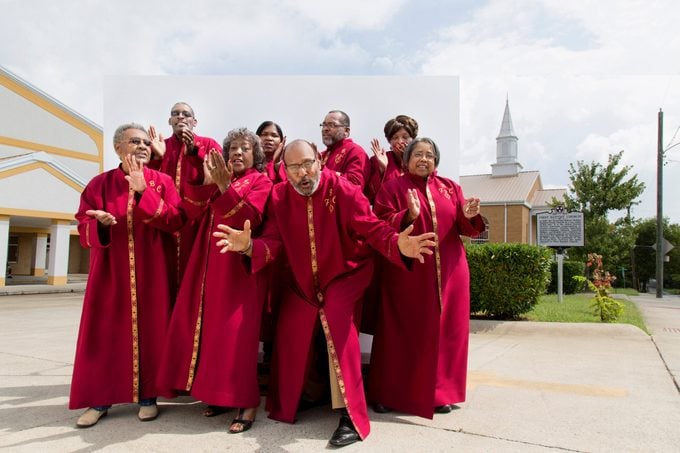
The Story of Gallatin
Founded in 1802, Gallatin is a farm-community-turned-suburb nestled against Old Hickory Lake in the Cumberland River valley. Subdivisions now bloom where crops once grew, ringing an old town square dignified by stately brick buildings and a regal county courthouse. Twenty years ago, it was a sleepy community of under 10,000 residents and downtown businesses worked hard to stay afloat. Now, nearing 40,000, Gallatin’s 30-minute proximity to booming Nashville has given the town new life. Investors have moved in to develop downtown commercial real estate. Houses are springing up almost as fast as people from all over the country can move into them, and a hip new coffee shop in one of the town square’s premier buildings, just renovated to accommodate a wide range of new commercial enterprises, is a symbol of what’s become of this former small town. (Don’t miss these 21 small towns, which are some of the nicest places to visit in the country.)
Like many towns of its size in the South, smiling and waving to passersby and rolling out the welcome mat to strangers is par for the course. But that’s just a small part of what makes Gallatin the Nicest Place in America.
Today, Gallatin is fairly diverse, with about three quarters of the population white, about 15 percent African American, and the rest of mix of Latino, Romanian and Sudanese, the latter a community welcomed in the 1990s when Gallatin High was one of the only in the country to accept the refugees as students, many of them older and lacking in English skills.
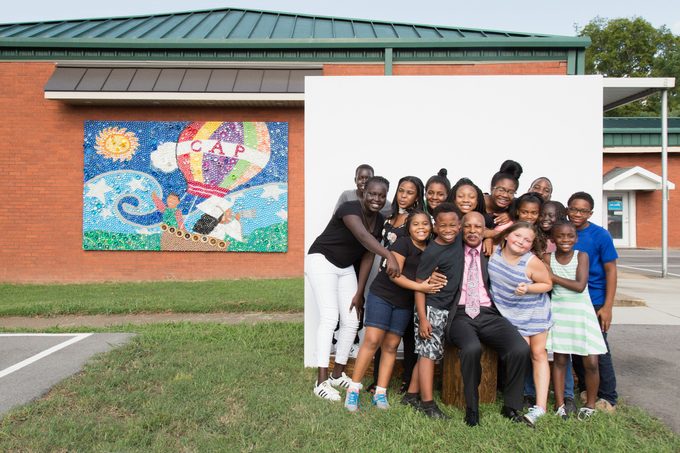
New People, New Ideas
“Back in the day when I was coming up, it was a ‘know your place’ kinda thing,” said Fred Bailey, the head of a local nonprofit that helps disadvantaged children learn life skills.
Bailey grew up as one of 15 children, his parents sharecroppers. He was born blind but went undiagnosed until the third grade. After a career at General Electric and as a wrestling coach, Bailey went on to found Children Are People, which has helped over 600 local children learn to work hard and build their personal characters.
“Now you’ve got people moving in here from New York, California, everywhere,” Bailey said, “and they exemplify Martin Luther King’s attitude: judge someone by their character. Gallatin is about that now.”
Sons and daughters of the town are making an impact, too. Perhaps none more important than Police Chief Don Bandy.
A turning point for Gallatin was 2011, when Bandy was named chief. He replaced a predecessor who believed in policing by numbers and who stepped down shrouded in scandal and under investigation by state authorities.
Velma Brinkley, an African American activist and historian, recalls inviting patrol officers to the ribbon cutting for a new business her god-daughter was opening. She was floored when not only did they show up but Bandy came as well. They celebrated the opening of a new hair salon together.
“Years past, I would not have invited the police to anything, not to mention to a ribbon-cutting,” said Brinkley.
Bandy is hesitant to criticize his predecessor but has a different way of doing things. His strategy is to have his force get to know everyone in the community.
“When you make yourself friendly, you have a better chance of making a friend,” he said. “You have to go across the aisle and say, I want you to be part of us and I want to be a part of what you’re doing.”
Bandy has his officers attend dozens of local events, and he is adding more every year.
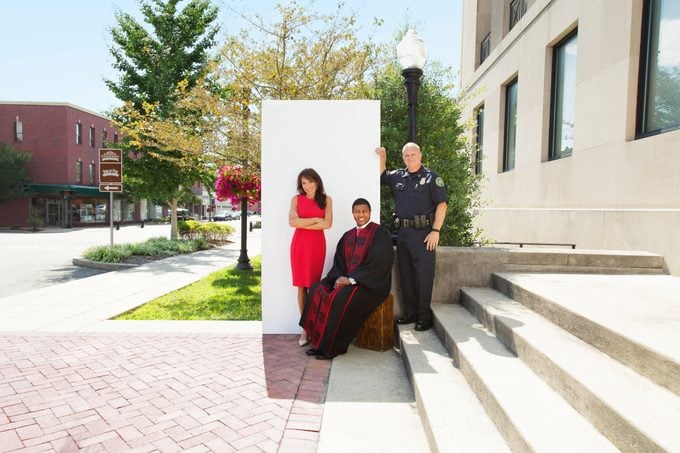
Tragedy Shows the True Grit of Gallatin
Police work in Gallatin is not all cookouts and basketball games. Sometimes it’s difficult moments, like when Officer James Spray pulled up in his squad car to the house of Laronda Sweatt on April 6, 2016.
Following the shooting, residents, leaders, and activists were on edge, saddened and angered by the death. The local district attorney immediately opened an investigation.
“I called the D.A. and said I wanted to release the [body cam] video,” Bandy recalled. “He said he wanted to do a press conference and I said, ‘this town can’t wait for that.’”
The day following the shooting, Bandy called on the mayor, Paige Brown, and leaders in the African American community to view the footage. He told them that as soon as they saw it, he was going to release it to the public.
The raw footage is disturbing and hard to watch. Because it’s from a body cam, it is from your point of view. The 11 heart-pounding seconds have been watched over 100,000 times on YouTube alone.
For a community like Gallatin, for America as a whole, there are questions we are still seeking to answer about the injustice of poverty and the difficulty of getting good treatment to mental illness for everyone who needs it. Laronda Sweatt, who had been a nurse and was “the best mother,” according to her daughter, suffered from bipolar disorder and was on medication. But the video and evidence gathered in an investigation following the shooting clearly showed that, in that moment, the police officer served to the best of his ability. Gallatin residents and community leaders, white and African American, who viewed the video all told Reader’s Digest the same thing: the loss of life was heartbreaking, but the police officer did what he had to do in that moment.
[pullquote]The loss of life was heartbreaking, but the police officer did what he had to do in that moment.[/pullquote]
What seemed like it might have been an injustice was merely tragedy. In responding to the local district attorney’s decision to not press charges, Chief Bandy channeled the sentiments of the town in The Tennessean, “You still have a family that has lost a loved one [and] you’ve got a police officer that has taken a life in his line of duty. It’s a very tragic and unfortunate incident.”
Then the town leaders did the only thing that made sense to them. They had a prayer vigil in the square. Nearly 100 residents, including 20 police officers and nine pastors, five white and four black, gathered to talk and to pray.
“Over the last few days, we’ve seen some tragic events unfold that simply devastated us,” said Tiffany Hammock, a Gallatin resident. “As I look into this crowd tonight, I am reminded that we are all called to be builders of our community. We have to start with respect. We all may be different, but we all feel the same—that we need to unite to make our communities safe and productive.”
Chief Bandy also spoke.
“We’re trying. Are we perfect? No, we’re not. But God has his hand on us, and we’ve got God-fearing people here,” he said.
It’s a time and an event that all remember as bringing the town closer together. It was both a symbol of how far Gallatin has come as well as a catalyst for more progress.
“The prayer vigil brought a sense of peace to the community,” said Onnessia Head, a school teacher in Gallatin and an African American who is also active in the nonprofit community. “Seeing the cam footage, you put yourself in the position of the police officer. You feel for both sides.”
In Gallatin, there’s a well-maintained church on every block. Prayer is how this community heals. Recently, Bandy was even asked to preach an hour at one of the African American churches.
“There was never a little blue book that told me what steps to take,” said Bandy. “We’re servants and should have a servant’s attitude. That’s what Gshaod asked in the Bible. We’re here to work for these people.”
Sounds good, but it’s not just talk.
“He’s a product of the community and that makes a difference,” said Head, the school teacher. “His kids go to school with my kids.”
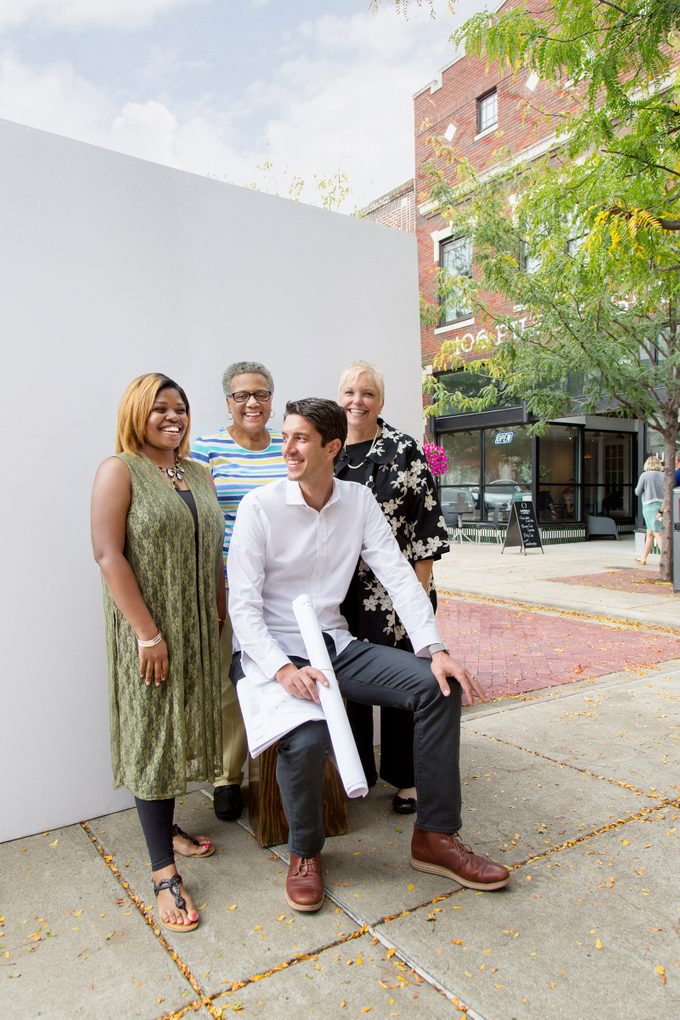
Charity and Creative Kindness
In addition to Children Are People, Gallatin is a hub of nonprofit and charity work. The town is home to a Shalom Zone, one of 200 in the world and the largest, both by number of organizations served and physical size. The Shalom Zone’s mission is to provide below-market rent for nonprofit offices and meeting spaces. Gallatin’s Shalom Zone is located in what once was a high school reserved for African Americans only. The building no longer served a purpose following forced desegregation in 1971. Gallatin was one of the last places in America to integrate. Where there were once classrooms and teachers’ lounges for a separated and subjugated population now are modestly renovated suites for non-profit workers, volunteers and those they serve.
“We acquired this school from the county 10 years ago for $1,” said P.J. Davis, the Shalom Zone’s executive director. “We do career development, we have a mentoring program and we’re a catalyst for other nonprofits in the area. We have 130 on our roster.”
A small corner suite serves as the modest headquarters of the Sudanese Youth Connection, an organization that helps the Sudanese community in Gallatin acclimate and get education. Its founder, Tut Rut, has been a Tennessee resident since 1995 when he fled government-sponsored violence in his village.
Beneath a poster of Martin Luther King and a small sign that says “Peace,” Rut recalled how attackers burned villagers alive and bayonetted the elders. Gallatin has welcomed the Sudanese.
“I’m so blessed,” he said. “The town is very good for us. I don’t see any kind of discrimination. We feel like this is our home now.”
Residents who want to help come and go freely. One, Laura Riley, a transplant from New York who was born in Puerto Rico, is working on helping the local Hispanic community.
“I wanted to start conversations about a couple of things very important to me,” she said. “Education, nutrition, physical fitness and citizenship.”
Soon, the Shalom Zone will be able to welcome even more charity under its roof. Only part of the school has been rehabilitated. Studies are now being done on which parts of the building to invest in next. Davis walks the halls with pride, showing off the server room and new linoleum floors in a recently finished suite. A transplant from Akron, Ohio, Davis has pride for the town and how it’s changing.
“We’re seeing generational change. The generations are slowly changing,” she said.
A local teen generated nationwide media coverage last year when she raised thousands of dollars to make the Christmas wish of a mentally challenged child in the area come true.
Gabby Howell, 12, suffers from a rare disease that has limited her capacities and gives her seizures. When asked what she wanted for Christmas, she said, “A real school bus.” Jessi Smith, a student at Gallatin High and a former student of Amy Howell’s, Gabby’s mom, got wind of this and Operation Christmas Bus was born.
She raised money to buy an old bus that was rusting out in the woods. Then, with the help of her fellow students as well as folks around town, she renovated it into a playroom and hangout spot that any kid would love. On Christmas Eve, the bus was towed to the Howell’s rural home, with Santa Claus at the wheel. Gabby ran to Santa, saying through tears, “I love you, Santa.”
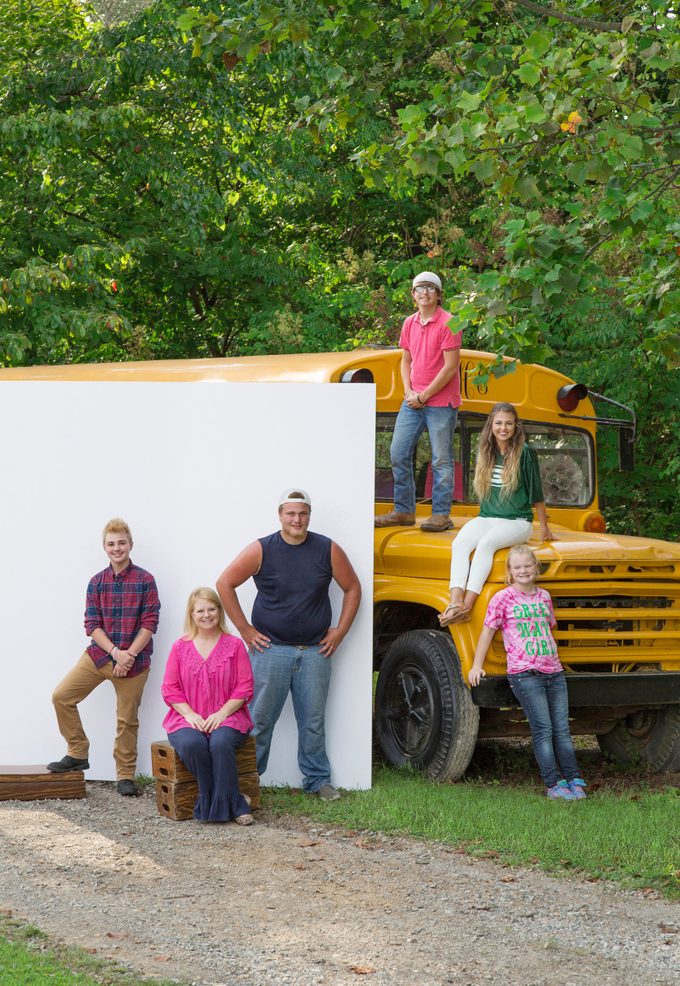
The teens visit the bus regularly, checking in on things that need fixing, improvements that can be made, and spending time playing with Gabby.
“It was just so sweet,” said Gabby’s mother. “To see that they want to give back like that—they don’t want to do it for the glory. They want to do it because they love you.” (Read up on 21 other random acts of kindness that will truly warm your heart.)
This is all part of the new Gallatin, according to Mayor Brown, who nominated Gallatin for Nicest Place in America. Acts of kindness are the norm, she says. For instance, when a beloved local pastor was stricken with cancer, residents raised thousands of dollars. When area charities need transportation, a local business owner lends them the busses he rents to Nashville stars.
Today, Gallatin is a community that everyone takes pride in like never before. Police Chief Bandy has spent his whole life in Gallatin and he worries every day about living up to the pride of his neighbors.
“Being a part of this community, growing up in it, I don’t want to let the citizens down,” he said.
With Gallatin and its new wave, “it’s like night and day,” said Pastor Jackson, adding, “the beauty about Gallatin is that there is an attempt to do what others feel is impossible.”
Bill Hangley contributed to the reporting of this story.
